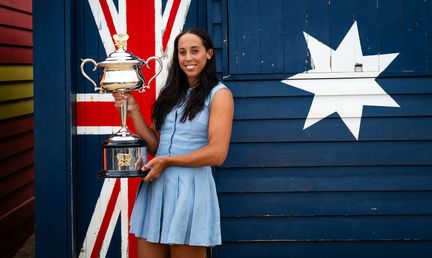NEW YORK, NY, USA - No.20 seed Naomi Osaka has made history for both herself and her country at the US Open, overpowering the unseeded Lesia Tsurenko 6-1, 6-1 in just 58 minutes in Wednesday's first quarterfinal.
The victor was sanguine afterwards. "It means a lot," she said. "But for me I feel like I was much more emotional for the quarters. And then now I feel like it's sort of like business again.
"Quarters was sort of my mental goal, like every time I played a Grand Slam. And then after I went into the quarters, I kind of want to keep going, so I feel like I have to be focused again and keep trying really hard."
The 20-year-old has now made her maiden Grand Slam semifinal in her 11th main draw, and in just her third appearance in Flushing Meadows. She is the youngest US Open semifinalist since a 20-year-old Caroline Wozniacki reached this stage in 2010, and takes over from Jelena Ostapenko as the youngest active player to have made the final four of a major.
Osaka is also the first Japanese woman to reach a Grand Slam semifinal since Kimiko Date at Wimbledon 1996 - and the first to reach this stage at the US Open in the Open Era.
.@Naomi_Osaka_ races to take the first set 6-1 over Tsurenko!
A semifinal spot is on the line...#USOpen pic.twitter.com/J0H65Mrwa0— US Open Tennis (@usopen) September 5, 2018
The Indian Wells champion did not play as though weighed down by all these milestones, though. She opened the match with a 116mph service winner, just 3mph under her tournament fastest, and wrapped up her first service game with an ace and three unreturned serves. Over the course of the first set, Osaka would not concede a point behind her first serve; she would lose just six points on serve over the entire match, at one stage capturing 20 out of 21 points behind it. All of this was despite a first serve percentage of just 59%.
Tsurenko, who had struggled physically throughout her marathon fourth-round win over Marketa Vondrousova, would attempt to avoid getting dominated by going for her shots earlier in the rally than her powerful opponent - but lacked the control to make the strategy work. Overpressing on both rally shots and when in command, the Ukrainian racked up 31 unforced errors across the two sets, with her backhand going awry most often - long, wide and into the net.
"I just woke up today with a viral illness," said Tsurenko afterwards. "I think. I don't know... my throat is not well. I'm not breathing well.
"I hate matches like this. I didn't want to show this kind of game in front of this big crowd, but unfortunately I'm just not able to play now."
👀@Naomi_Osaka_ can see the finish line ahead.
She leads Tsurenko 6-1 3-0...#USOpen pic.twitter.com/AbmMZGfHV0— US Open Tennis (@usopen) September 5, 2018
A handful of more positive point construction to open the second set still couldn't pay dividends for the 29-year-old, and Tsurenko was broken from 40-0 up off the bat as Osaka responded with some forehand fire.
The Japanese No.1 would go from strength to strength on serve as she continued to reel off a stretch of 10 consecutive games from 3-1 up in the first set to 4-0 up in the second. The sixth game, though, would find her in trouble on serve for the first and only time in the match as Tsurenko finally found her groove on the backhand to hammer two excellent winners down the line.
Osaka's response was that of a champion. A service winner, a patiently constructed but relentlessly aggressive baseline rally and a fifth ace snuffed out any possibility of even a mini momentum shift, and another handful of unreturned serves captured the game.
Afterwards, she discussed how her shock title run in Indian Wells in March, over the course of which she defeated four Grand Slam champions or finalists without dropping a set, had prepared her mentally for a deep run in a major.
"Now I feel like the state of mind that I have here is, it's like - I don't feel pressure, so I feel a little bit like I'm used to it," she explained. "In Indian Wells I got a bit distracted if I'm in the lead. And now I feel like I'm finding it easier to try to close it up as quickly as I can."
6-1, 6-1 in under an hour:@Naomi_Osaka_ reaches her 1st Grand Slam semifinal after defeating Tsurenko!
She’s the first 🇯🇵 woman to reach the semis since 1996...#USOpen pic.twitter.com/DKHGR2kpt7— US Open Tennis (@usopen) September 5, 2018
With Tsurenko now entirely out of ideas, the final game felt like a formality as the Acapulco champion sent down her third and fourth double faults of the day. On Osaka's first match point, she hammered a return at her opponent's feet, and Tsurenko could do little more than send her response into the bottom of the net.
The only previous time the pair had played had been in the very different environs of the 2014 ITF $25,000 event in Irapuato, Mexico; back then, a 16-year-old Osaka had taken the match 6-4, 6-3. Four-and-a-half years on, her dismissal of Tsurenko on a much bigger stage would be even more emphatic. Osaka's next match will be a tougher challenge: either No.14 seed Madison Keys, against whom she lost a 5-1 final set lead in the third round here two years ago and is 0-3 against overall; or No.30 seed Carla Suárez Navarro, her conqueror in the first round of Montréal a month ago.
Winning in New York would be particularly special for Osaka, who grew up on Long Island as a child before moving to Florida. "I always thought if I were to win a Grand Slam, the first one I'd want to win is the US Open," she mused. "Because I have grown up here and, like, then my grandparents can come and watch. I think it would be really cool.
"It was the first tournament that I saw all the people that were playing on TV. So I thought it was something really amazing. Just to see them in person and experience the atmosphere... I thought it was really cool."
Now, Osaka is one of those players on TV - and seeing the same experience from the other side is proving to be just as cool.







